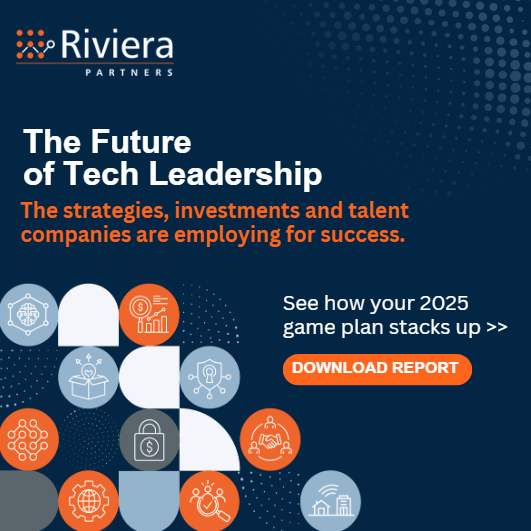
Technology leaders are facing a three-headed monster of a challenge with artificial intelligence, economic uncertainty, and shifting workforce expectations shaping the present era. Riviera Partners’ new Future of Tech Leadership Report provides a look at the strategies and insights of nearly 1,000 technology executives navigating this complex landscape. Based on extensive surveys and focus group interviews, this report highlights the most critical trends shaping the future of tech leadership—and what executives and talent leaders can do to thrive in this environment. Here’s what to know:
AI takes center stage
One of the clearest trends emerging from the report is the growing centrality of AI. 75% of leaders surveyed named AI or generative AI as one of their top three technology priorities, underscoring the enormous impact AI is expected to have across industries. Leaders view AI as more than a technological tool; they see it as a game-changer with the potential to revolutionize productivity, automate complex tasks, and transform business operations.
However, maximizing AI’s potential requires a specific type of leadership. The report highlights the need for executives who can develop AI strategies that align with business goals and possess the expertise to manage specialized AI teams. Companies that fail to adapt will be left behind as competitors push forward with AI innovation.
The takeaway:
AI isn’t optional—it’s essential for tech companies. Focus on upskilling your leadership team and creating AI-driven strategies that are integrated into your broader business objectives. Understanding how to lead AI projects and implement AI technology effectively will be key differentiators.
The talent arms race: budget vs. expertise
While AI is a key focus, attracting the right tech talent to operationalize these strategies remains a significant challenge. The report revealed that 63% of organizations are struggling with budget constraints when hiring technology talent. High compensation demands and a lack of available candidates with the necessary technical skills are major barriers, with 46% citing compensation requirements as a top concern.
In response, companies are adopting more strategic hiring practices, focusing on roles that drive immediate impact, such as engineering, product, and sales positions. Despite economic pressures, organizations understand that investing in the right talent is crucial for future growth and staying competitive in the tech industry.
The takeaway:
To win the technology talent war, prioritize key roles that directly impact your AI and innovation strategies. Be prepared to offer competitive compensation and benefits packages that attract top candidates, but also be strategic in targeting the roles that will provide the highest ROI for your company’s AI investments.
Leadership evolution: pragmatic over visionary
Another striking finding is the shift in leadership preferences. Gone are the days when visionary, risk-taking leaders were the gold standard. Today’s businesses are looking for pragmatic leaders who can execute strategies while navigating economic turbulence. 52% of respondents indicated that they prioritize practical, results-oriented CEOs over charismatic visionaries.
The takeaway:
Develop a leadership style that balances pragmatism with strategic thinking. Focus on execution and adaptability, as today’s tech leaders are expected to wear multiple hats and deliver results across a wider scope. This approach will be particularly important for companies navigating economic uncertainty.
Remote work: Flexibility vs. In-office collaboration
The remote work debate continues, but the consensus among tech leaders is clear: flexibility is here to stay. 70% of organizations plan to maintain a hybrid or fully remote work model in 2025, although 23% of companies are pushing for more in-office time. This reflects an ongoing tension between the desire to attract top technology talent, who often prefer remote roles, and the need for in-office collaboration and cultural cohesion.
The report warns that companies that push too hard for in-office mandates may risk alienating top performers. In contrast, organizations that embrace flexible work arrangements are more likely to retain their top talent and foster a culture of innovation and employee satisfaction.
The takeaway:
Embrace remote work flexibility in your work policies. Tech talent values remote work and offering hybrid or fully remote work options can be a competitive advantage in attracting and retaining top technology professionals. Ensure your company’s work-from-home policy aligns with current trends and tech industry best practices.
Actionable next steps for tech execs:
- Prioritize AI in your tech investments and ensure you have technology leaders capable of driving AI initiatives.
- Take a strategic approach to hiring, focusing on high-impact roles like engineering, product, and sales.
- Cultivate pragmatic leadership within your organization, ensuring your executives can execute under pressure.
- Embrace remote work flexibility to attract and retain top technology professionals, balancing it with collaboration strategies.
The future belongs to the agile and strategic
The Future of Tech Leadership Report makes it clear that success in the coming years will require more than just keeping up with technology trends. Leaders must be agile and willing to expand their scope to help drive growth — 67% surveyed agreed companies are expecting leaders to broaden their roles.
The organizations that strategically invest in the right technology talent, foster flexible work environments, and prioritize pragmatic leadership will be well-positioned to thrive in this evolving landscape.
Explore more Future of Tech Leadership insights: View the Report
About Riviera Partners
Riviera Partners is a global driver of innovation for today’s most influential companies – expertly placing executive talent in the crucial areas of IT, software engineering, product management, security, AI/ML/Data, and design. Riviera combines over two decades of recruiting expertise with a proprietary platform that uses machine learning to score and predict the best candidate for a company’s specific needs, driving successful outcomes. As a result, the company has become the go-to talent partner for leading private equity investors, venture capitalists, public companies and technology innovators.
